
SEO Specialist
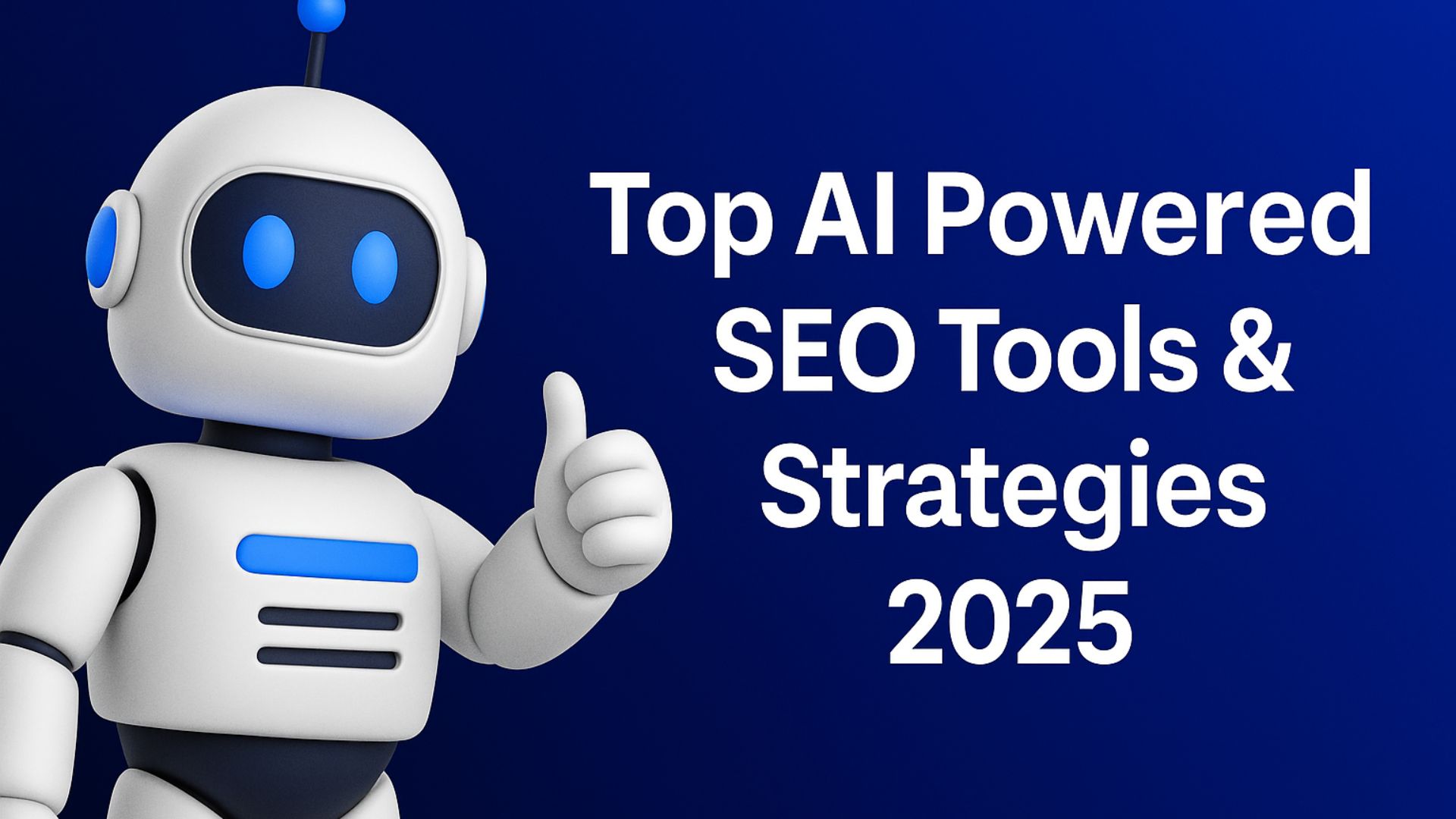
AI SEO enhances keyword research, automates content creation and technical tasks. This article will cover the best tools and strategies for 2025. Learn how AI can help you win at SEO.
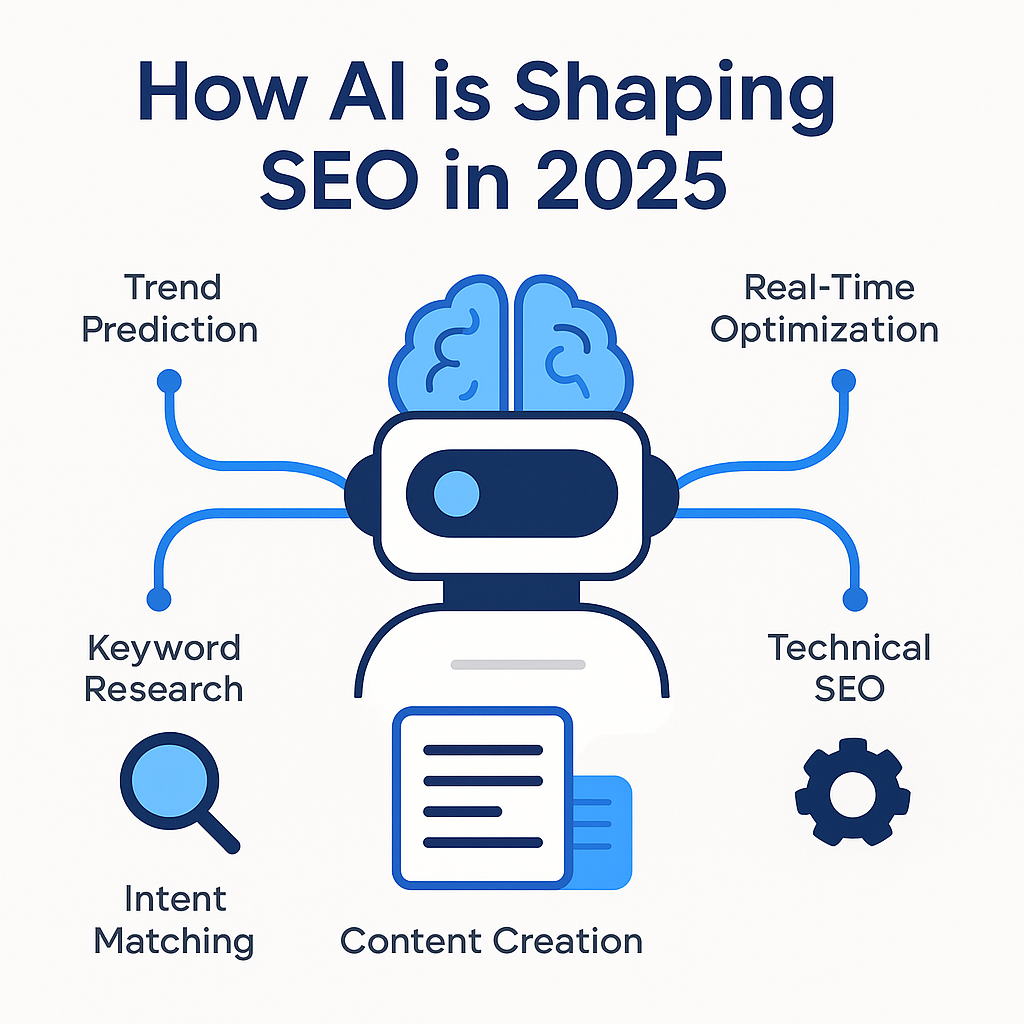
Artificial intelligence is changing SEO by optimizing, predicting search trends and personalizing user experiences. AI technologies like machine learning and natural language processing are transforming the SEO landscape. AI advancements are driving the rapid pace of SEO, optimizing webpages through better keyword research and content creation.
AI algorithms personalize SEO by understanding user intent and delivering more relevant ai powered search results. This integration makes accuracy and efficiency in attracting organic traffic so SEOs can focus on strategy not repetitive tasks.
We’ll look at how AI enhances keyword research, powers content creation and automates technical SEO tasks, all essential for SEO strategies in today’s digital marketing.
AI tools streamline keyword research by:
This level of insight allows marketers to find high performing keywords and identify high value keywords, predict future search trends, keyword difficulty, search rankings and related keywords, so the overall strategy is more targeted.
AI can help with keyword research and SEO by:
AI in keyword research uncovers content opportunities, gaps and trends so your content is aligned with the latest search trends and user intent, making SEO efforts more effective and targeted.
GPT-based AI platforms help marketers create content that aligns with search engine algorithms and user intent. Effective prompting enhances AI generated content by guiding it to produce content that meets user goals. MarketMuse helps create faster by generating content briefs that improve overall content quality. Semrush’s Topic Finder tool finds high potential topics based on search volume and user intent.
ChatGPT creates content from idea to publish ready draft. MarketMuse generates a first draft and gives real-time SEO suggestions so the process is faster and content is optimized for search engines. Digital marketers use AI for content tasks like writing copy for blogs and websites.
MarketMuse analyzes thousands of pages to align content with SEO best practices. Its Content Optimizer tool analyzes content and suggests enhancements based on target keywords. By using AI tools businesses can create optimized content for their online store that ranks well on search engines, drives more organic traffic and improves SEO through content marketing.
AI does technical SEO tasks like site audits and meta description generation much faster than manual methods including internal linking strategies and generating SEO friendly meta descriptions. Automation not only saves time but also ensures technical SEO tasks are done accurately and efficiently. AI tools can streamline and automate technical SEO tasks so efficiency and effectiveness.
67% of SEOs believe AI can automate and speed up processes so teams can scale without increasing size or budget. Automation allows SEOs to focus on higher level strategies and creative aspects so efforts are more effective.
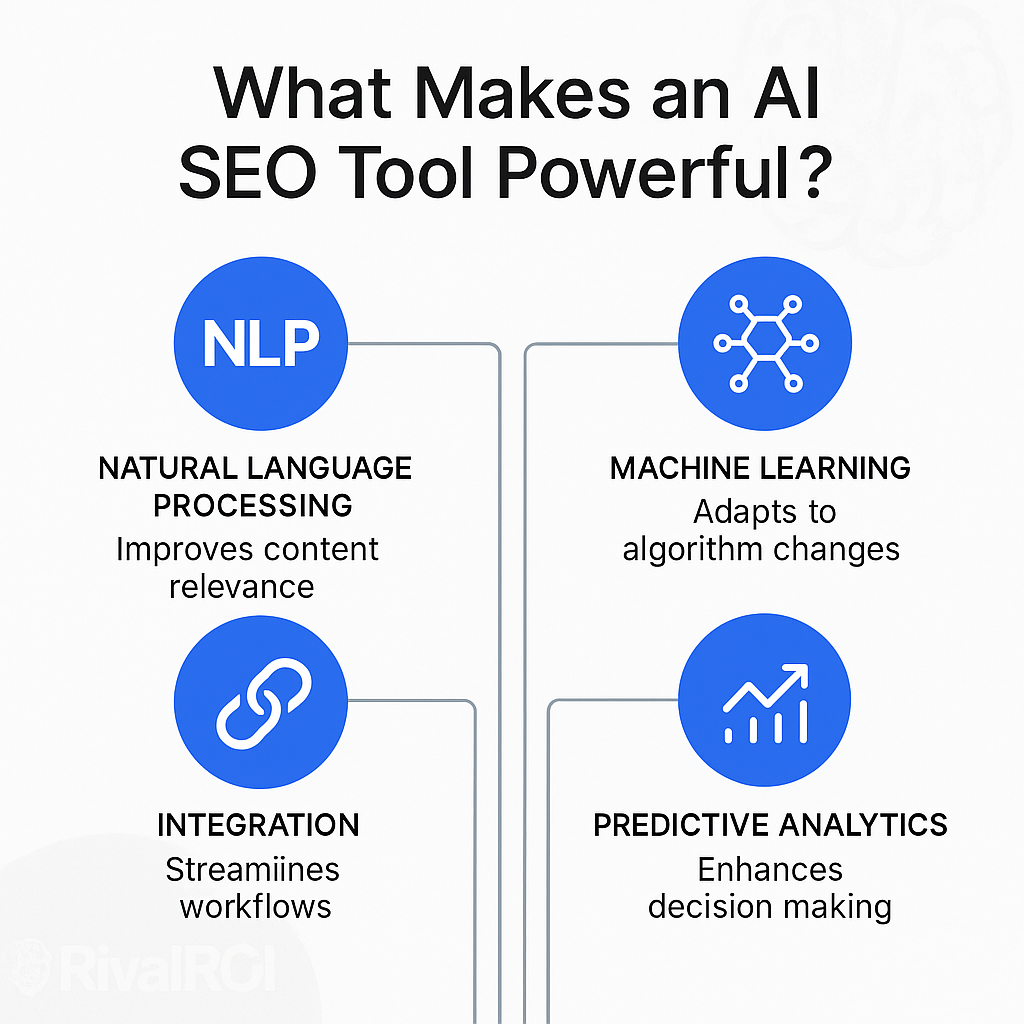
Effective AI SEO tools use advanced natural language processing and deep learning algorithms to power functionality. They automate repetitive tasks like content ideas, SEO descriptions and keyword optimizations so efforts are faster and more effective. Comprehensive AI powered SEO tools cover aspects like in-depth keyword research, content optimization, technical audits and real-time data tracking.
AI tools for SEO provide robust keyword research capabilities, giving insights into search volume, competition and trends so targeting is more effective. By using AI SEOs can get a competitive edge through accurate and efficient SEO strategies especially when using ai search engines.
We’ll look at key features of AI SEO tools, focusing on natural language processing, machine learning algorithms and integration.
NLP allows AI tools to:
AI automates meta descriptions and headers so alignment with best SEO practices. Automation saves time and ensures technical SEO tasks are done accurately and efficiently.
AI-powered SEO tools adapt to algorithm changes and user behavior, so they are essential in the ever-changing world of SEO. The evolution of SEO has moved from traditional methods like keyword matching and link building to AI-driven strategies that use machine learning. These algorithms allow for predictive analysis and rapid response to market shifts so SEO strategies are more accurate.
AI tools analyze website performance, find content gaps, keyword opportunities and user experience issues. Data-driven insights from an AI tool significantly improve the accuracy and effectiveness of SEO strategies. The quality of input affects the quality of output from AI tools.
Machine learning makes SEO strategy more flexible and responsive to search engine algorithm changes, better outcomes. Strong integration capabilities allow AI SEO tools to consolidate data from multiple sources for comprehensive insights.
When choosing an AI SEO tool consider scalability, pricing and performance balance. Indicators of better integration are established partnerships with leading platforms and seamless integration through APIs and connectors. The integration process for AI SEO tools should be smooth and cause minimal disruption as seen with Hubspot’s AI tools that integrate seamlessly with their other marketing tools.
Seamless integration between AI SEO tools and existing tech stacks improves workflow efficiency and reduces redundancy so all SEO efforts are aligned and optimized for maximum effectiveness.
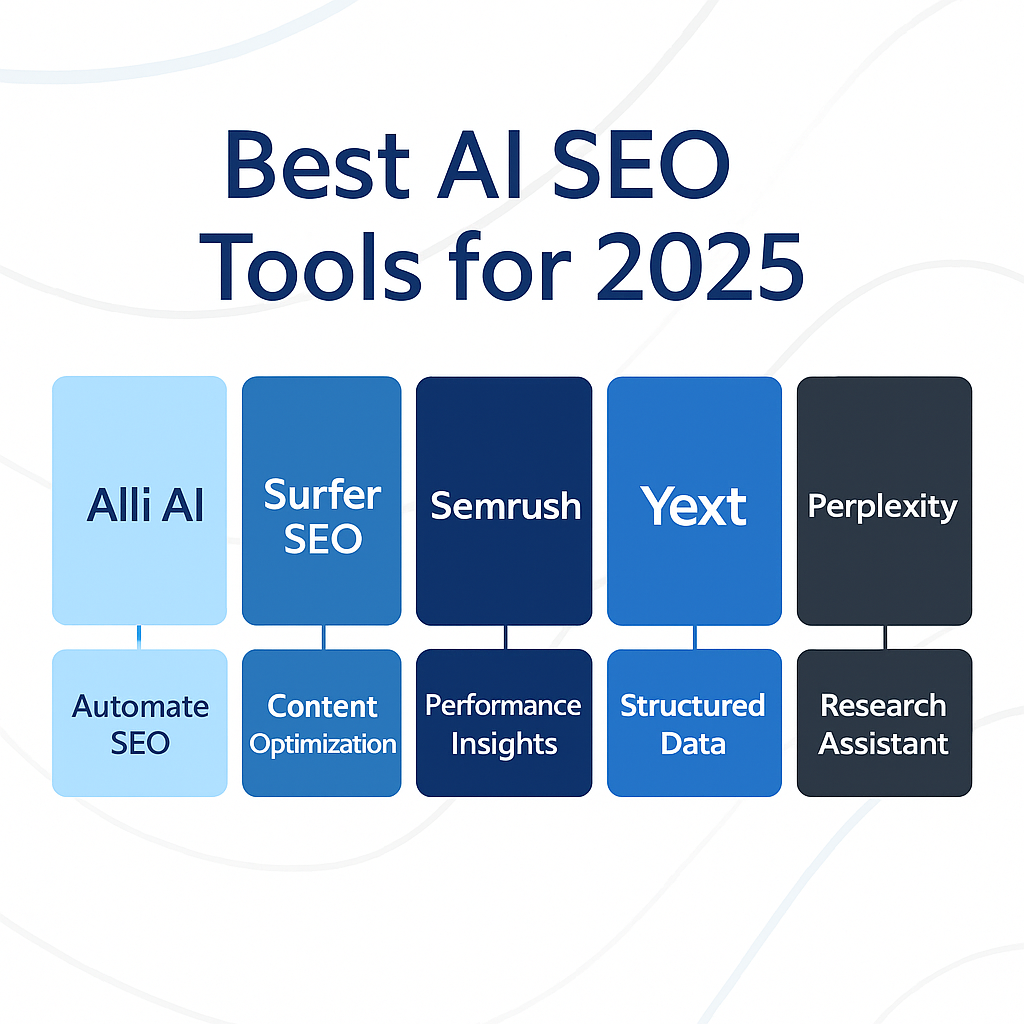
AI powered SEO tools are changing how marketers optimize content, manage websites and stay ahead in search results. These platforms streamline everything from keyword research and content generation to technical audits and real-time performance tracking. Below are some of the best tools in 2025, each with unique benefits depending on your goals, team size and workflow.
Alli AI is a full platform to automate technical SEO across your entire website. With a few clicks it finds and fixes common issues like missing canonical tags, duplicate meta descriptions and slow loading pages. What sets Alli AI apart is it can push bulk changes into your CMS so you can make wide reaching changes without needing developer support. Perfect for marketing teams that want to stay agile and have a technically healthy site. It also provides AI driven overviews and recommendations to guide your optimization efforts in a clear and actionable way.
Surfer SEO combines machine learning and user friendly design to help marketers create content that ranks. It does real time audits of your web pages, compares them to top performing SERP competitors and suggests keyword usage, NLP terms, structure and readability. Whether you’re optimizing blog posts or product pages Surfer provides a roadmap to align your content with what search engines are prioritizing. Seamless integration into content workflows makes it a go to tool for SEO professionals and content creators looking to boost organic traffic through high quality, targeted content.
Semrush’s Copilot and AI Toolkit are for teams that want visibility and control over every aspect of their SEO strategy. The platform automatically detects technical issues like broken links, missing H1s or crawl errors and ties these alerts to key performance data including Position Tracking and Keyword Gap reports. By analyzing six core SEO reports it helps uncover patterns and trends to inform smarter decision making. Unlike generic AI tools Semrush offers in-depth insights that help businesses refine their strategy and stay ahead of algorithm changes. Perfect for enterprise level SEO teams and digital agencies that need scalability, depth and performance tracking in one place.
Yext Pages is for businesses that manage large volumes of location or service specific landing pages. It uses AI to automatically gather and populate structured data from your business listings or internal systems so your page content is consistent and search optimized. This tool is ideal for franchises, multi-location brands or ecommerce platforms looking to reduce the time and resources required for landing page production. With built in enhancements for mobile performance and local SEO relevance Yext helps teams roll out compliant and conversion ready pages at scale.
Perplexity AI helps marketers in the early stages of content creation by being an AI powered research assistant. You can upload long form documents like PDFs and get quick intelligent summaries or ask follow up questions to extract deeper insights. This is perfect for building editorial outlines, understanding complex topics or gathering data for whitepapers and blogs. The tool simplifies how information is consumed so content strategists can produce more informed, credible and engaging content.
AI Search Grader is for brands that want to understand and improve how artificial intelligence interprets their content and presence online. As AI generated summaries and featured snippets become more prominent in search this tool analyzes how your products, services and messaging appear across AI driven environments. It provides actionable insights on how to structure content, improve semantic relevance and stand out in AI powered SERPs. Perfect for marketing teams preparing for the future of search this tool helps businesses stay relevant as search engines evolve towards more conversational AI integrated experiences.
Free tools can save time and offer basic performance improvements but premium tools like Semrush, Surfer and MarketMuse offer more advanced features starting at around $60/year. The choice often depends on specific user needs and budget constraints.
Investment in the right tool depends on your SEO goals, team size and need for scale. While free tools are good for smaller tasks premium tools offer in-depth features that will significantly enhance SEO performance.
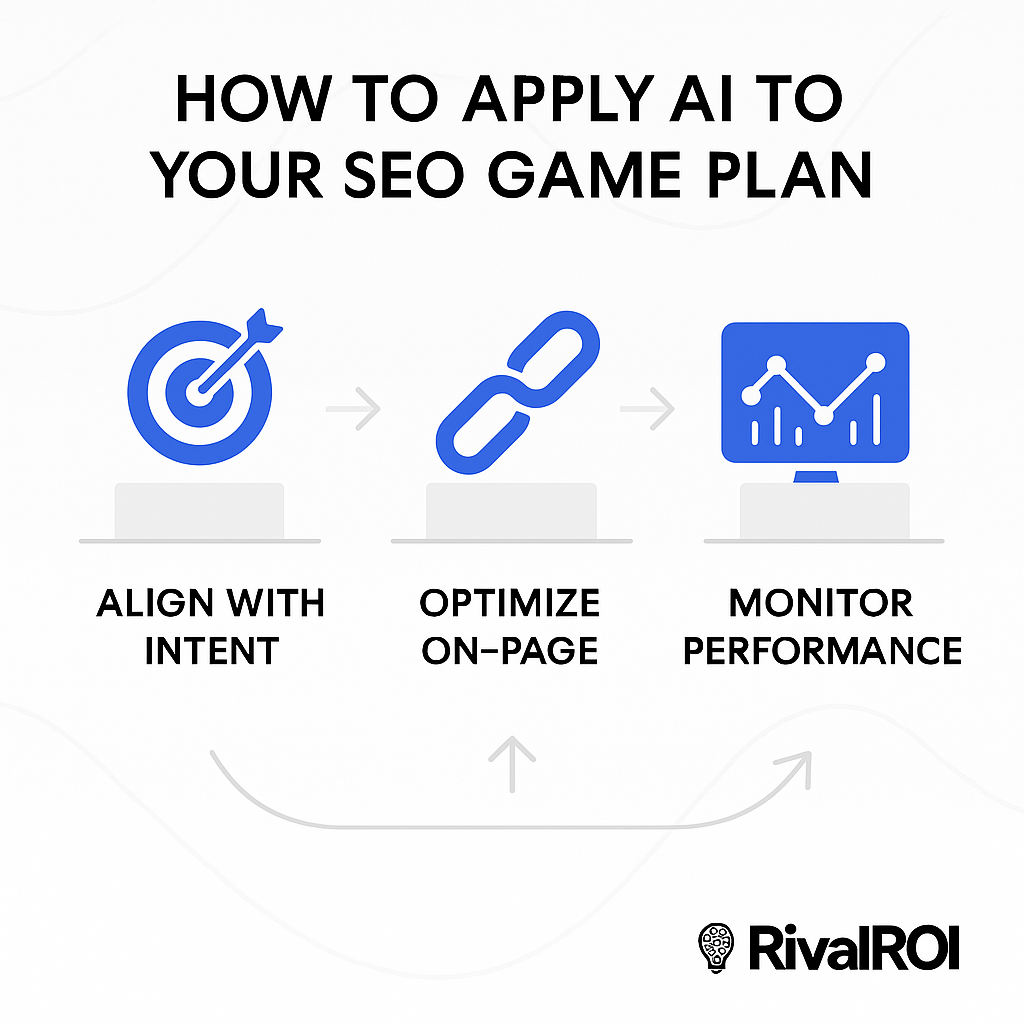
AI tools optimize SEO strategies by finding best performing keywords, predicting trends and automating content optimization. Balancing AI generated insights with human creativity and industry knowledge is key to success. AI can automate tasks like finding keywords and technical fixes so SEO professionals can focus on higher level strategies.
To succeed in AI driven SEO businesses must stay up to date with trends and leverage AI insights to optimize their online presence. We’ll explore specific ways to use AI in your SEO strategy including aligning AI with search intent, using AI for on-page optimization and monitoring with AI insights.
Using AI tools in SEO requires:
AI can analyze user data to personalise marketing strategies and create more targeted campaigns. Predictive analytics allows businesses to anticipate customer needs and offer accordingly.
Alli AI optimises SEO by automating on-page optimisation and keyword targeting. ChatGPT offers internal linking suggestions based on topic relevance, to improve site structure and user experience by creating internal links.
Using AI ensures on-page elements are optimised for search engine algorithms, to improve rankings and user experience and increase organic traffic.
AI SEO tools should integrate with analytics platforms for cohesive performance tracking. Continuously monitoring and adapting to AI insights helps businesses stay ahead of the competition.
This ongoing process ensures SEO efforts remain effective and aligned to current trends.
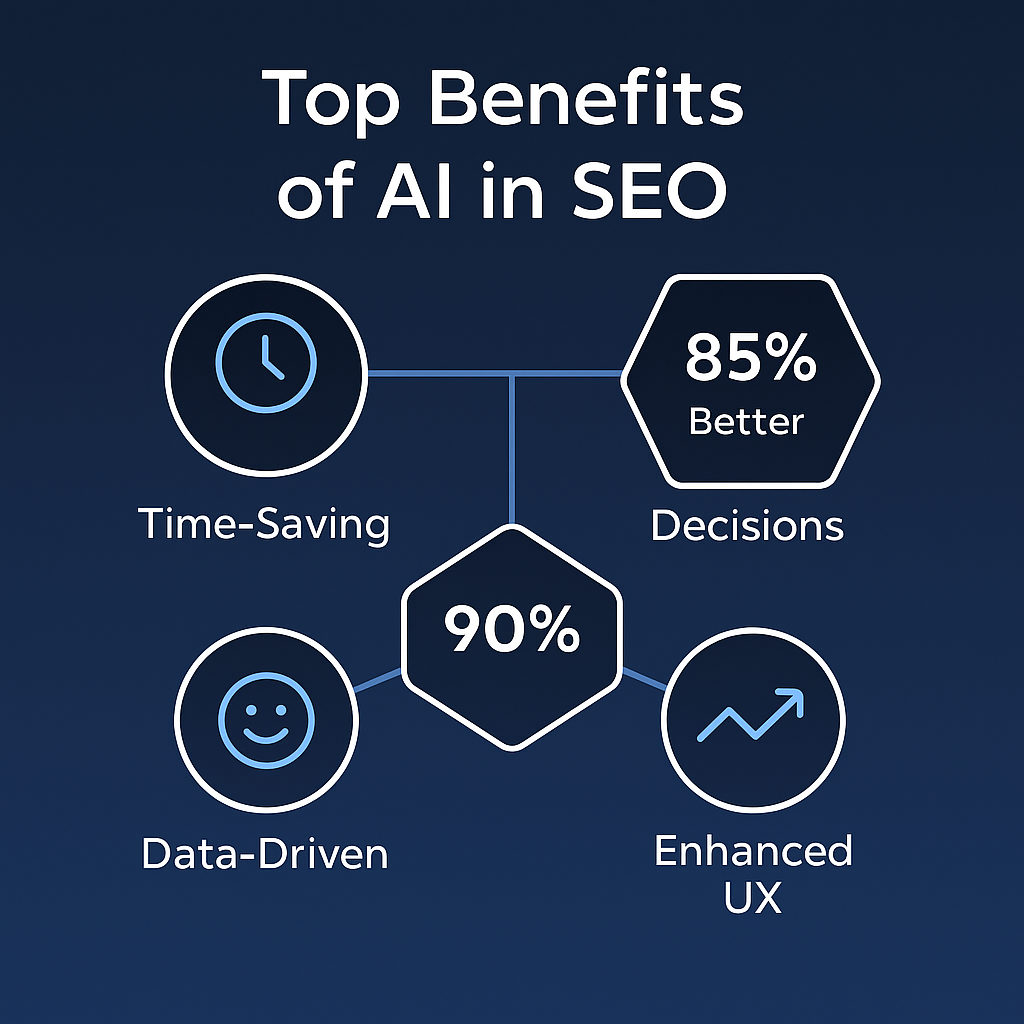
AI tools improve SEO by:
Artificial intelligence fundamentally changes search engine optimisation SEO strategies through these improvements.
We’ll explore the main benefits of AI powered SEO tools including time saving automation, better decision making and enhanced user experience, to understand how AI can boost your SEO.
AI does SEO tasks in minutes that would take humans hours or days. Integrating AI tools streamlines the SEO process, making it more efficient and data driven. AI SEO tools save a lot of time for SEO activities.
By automating repetitive SEO tasks, AI frees up time for more strategic activities through automated optimisation.
AI analyses data to prioritise audience needs, essential for content strategy development. Data driven insights optimise SEO decision making, to help businesses uncover valuable insights for strategy development.
AI delivers personalised content, making websites more engaging. AI powered SEO tools enhance user experience by making content more relevant.
Personalised content increases user engagement and satisfaction, leading to longer site visits and lower bounce rates. Using AI and user behaviour data, businesses create tailored experiences that attract and retain users.
The rise of AI tools blurs the line between human created and AI generated content, affecting perceived quality. To navigate these changes successfully, SEOs should:
There was initial skepticism around using AI tools like ChatGPT for SEO, particularly around manipulating search results. E-E-A-T (Experience, Expertise, Authoritativeness, Trustworthiness) is key to high standards in SEO, especially in SEO expertise and AI generated content.
To ensure content generated by AI tools is good quality:
High content quality standards are still important even with AI automation.
Staying up to date with algorithm changes is key to adapting SEO strategies, especially with Generative Search. By staying informed, businesses can ensure their SEO strategies remain effective and aligned to best practices.
Human intervention is still crucial in SEO strategies to have creativity and a personal touch that AI can’t replicate. By balancing AI tools with human expertise, businesses can create more effective and engaging SEO strategies.
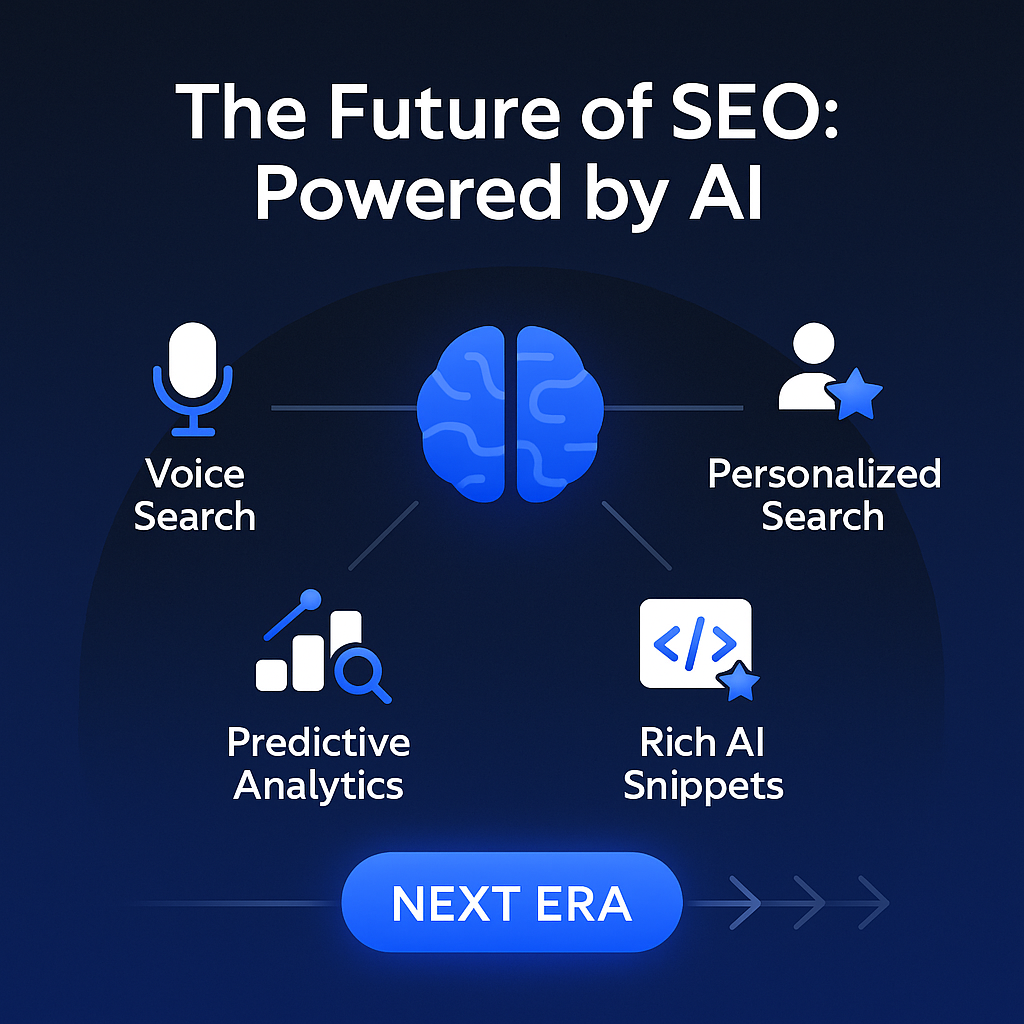
SEO will still be important but will need to adapt a lot to AI. Businesses need to align with AI driven SEO changes and use AI tools to maintain their online presence. Traditional SEO methods will still exist but will evolve with AI. The future of SEO will be all about adapting to technology and using AI.
AI driven technologies like featured snippets and rich results are changing SEO practices. To optimise content and improve rankings, using AI powered SEO tools is essential for better search engine results pages. More advanced tools will provide deeper insights into user intent and google search behaviour, revolutionising keyword research.
Voice search is becoming more important as more users are using voice activated devices for queries. With AI advancements, optimising for voice search and maintaining a consistent brand voice is crucial for businesses to capture their target audience.AI technology improves voice recognition, understanding user intent and natural language processing. As AI evolves, SEO strategies need to adapt to the changing voice search technology.
AI driven personalization allows marketers to tailor content to individual user preferences and behavior. Natural Language Processing (NLP) allows AI tools to analyze user interactions and generate content that resonates with target audience.
Machine learning algorithms enhance predictive analytics by analyzing trends and forecasting user behavior, so content can be proactive. By using AI for personalization and predictive analytics, businesses can improve user engagement and satisfaction.
In 2025, AI powered SEO tools are not just making things more efficient but redefining the SEO landscape. By automating technical tasks, optimising content and providing insights, these tools allow SEOs to focus on strategy and creativity. The benefits of AI in SEO, time saving automation, better decision making and user experience are undeniable.
As we look to the future, staying up to date with the latest AI and integrating these tools into your SEO strategy will be key. Embrace the power of AI and let it take your SEO to new heights. By doing so you’ll not only improve your search engine rankings but also create a more personal experience for your users.
AI helps with keyword research by generating keyword ideas and predicting trends based on user behavior so you can find high performing keywords faster.
Using AI for content creation makes content more relevant and efficient by generating content that aligns with user intent and search engine algorithms. This accelerates the content creation process and improves the overall effectiveness of the content.
AI automates technical SEO tasks by doing site audits, generating SEO friendly meta descriptions and streamlining internal linking strategies, making it more efficient. With these capabilities it allows for a more effective way of managing and optimising website performance.
Key features to look for in an AI SEO tool are natural language processing, machine learning algorithms and integration capabilities for a comprehensive SEO strategy.
Stay competitive with AI driven SEO by staying up to date with AI and using AI insights and balancing AI tools with human.